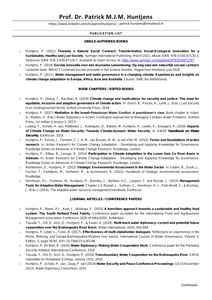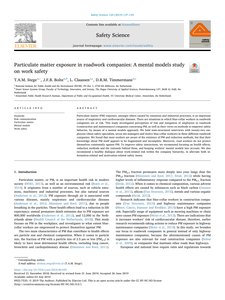De metingen van diverse innovatieve voorzieningen in proeftuinen op de Waterstraat in Delft en de Klimaattuin in Groningen vormen onderbouwing van de toekomstige richtlijnen voor klimaatadaptatie. De Urban Rainshell is een van die voorzieningen.
DOCUMENT
In this publication, the four authors provide several solution directions to shape that transition to a new, sustainable agricultural system. With a different relationship between food production and nature and the environment. It is the - necessary - basis for a good agricultural agreement. And the way to work towards a sustainable future for our agricultural sector and food system.
DOCUMENT

De publicatielijst bevat alle publicaties waar Patrick Huntjens aan bijgedragen heeft in de periode 1998 - 2021
DOCUMENT

The crossroads of living in cities on the one hand and ageing of the population on the other is studied in an interdisciplinary field of research called urban ageing (van Hoof and Kazak 2018, van Hoof et al. 2018). People live longer and in better health than ever before in Europe. Despite all the positive aspects of population ageing, it poses many challenges. The interaction of population ageing and urbanisation raises issues in various domains of urban living (Phillipson and Buffel 2016). According to the Organisation for Economic Co-operation and Development (OECD 2015), the population share of those of 65 years old is expected to climb to 25.1% in 2050 in its member states. Cities in particular have large numbers of older inhabitants and are home to 43.2% of this older population. The need to develop supportive urban communities are major issues for public policy to understand the relationship between population ageing and urban change (Buffel and Phillipson 2016). Plouffe and Kalache (2010) see older citizens as a precious resource, but in order to tap the full potential these people represent for continued human development (Zaidi et al. 2013), the world’s cities must ensure their inclusion and full access to urban spaces, structures, and services. Therefore, cities are called upon to complement the efforts of national governments to address the consequences of the unprecedented demographic shift (OECD 2015). Additionally, at the city level there is a belief to understand the requirements and preferences of local communities (OECD 2015). An important question in relation to urban ageing is what exactly makes a city age-friendly (Alley et al. 2007, Lui et al. 2009, Plouffe and Kalache 2010, Steels 2015, Moulaert and Garon 2016, Age Platform Europe 2018)? Another relevant question is which factors allow some older people in cities to thrive, while others find it hard to cope with the struggles of daily life? This chapter explores and describes which elements and factors make cities age-friendly, for instance, on the neighbourhood level and in relation to technology for older people.
DOCUMENT

The focus of my research is how Bartholomeus Guesthouse (BG), founded in 1407 by Willem van Abcoude, has organized care over more than 600 years for the elderly and elderly sick people in the Centre of Utrecht. After the reorganization of 1817 -by Royal Law- the 7 (9) Guesthouses were merged to one Board called “College van Regenten der Vereenigde Gods-en Gasthuizen” .They have had their domicile in Bartholomeus Guesthouse. This Guesthouse survived as elderly care centre on particular foundation, which has meant until today that people from different religions were welcome. The properties of the other guesthouses came under supervision of the Board of “Vereenigde Gods-en Gasthuizen”. The heritage of the other foundations was , in terms of property and land, considerable. In my paper I will present the following items: -An inventarisation of the situation after 1817 and the ‘cameren’ (vrij woningen) of the different guesthouses in Utrecht and what their (living) conditions were at that time; -the Policy of the Board supervising the Free Houses/ Cameren for Elderly during this area; the observation of the archive manager S.Muller Fz.is good illustration of the situation in 1900; -the inhabitants of the ‘vrij woningen’; the selection and the rules as part of the social housing policy; - a more general analysis: the policy of poor relief and the debate of who had to take care of the poor? - all subjects give an answer to the question whether or not poor relief can be regarded as a safety valve for the (lower) middle class, in the ninetheenth century.
DOCUMENT

This booklet reports on experiments carried out by Van Hall Larenstein University of Applied Sciences in the context of the VALUE project. It consists of three parts. The first two chapters describe some experiments carried out in the Dutch town of Amersfoort and the students’ input and approach. This is followed by an intermezzo on sources of inspiration outside the Netherlands and examples of the way urban green spaces and elements can provide an impulse for towns and cities. The final two chapters concern the way such a green strategy can be designed in Dutch urban settings. Chapter 5 discusses how local governments can use the added value provided by urban green spaces for new investments:value capturing. Chapter 6 focuses on a new type of planning: Planning by Surprise, which combines dreams and pragmatism. The photo essay at the centre of the book tells the story of the many sides of green spaces in towns and cities. Unintentional, intentional, planned, dreamed of, drawn,remembered, pictured, developed: Planning by Surprise.
DOCUMENT

Particulate matter (PM) exposure, amongst others caused by emissions and industrial processes, is an important source of respiratory and cardiovascular diseases. There are situations in which blue-collar workers in roadwork companies are at risk. This study investigated perceptions of risk and mitigation of employees in roadwork (construction and maintenance) companies concerning PM, as well as their views on methods to empower safety behavior, by means of a mental models approach. We held semi-structured interviews with twenty-two employees (three safety specialists, seven site managers and twelve blue-collar workers) in three different roadwork companies. We found that most workers are aware of the existence of PM and reduction methods, but that their knowledge about PM itself appears to be fragmented and incomplete. Moreover, road workers do not protect themselves consistently against PM. To improve safety instructions, we recommend focusing on health effects, reduction methods and the rationale behind them, and keeping workers’ mental models into account. We also recommend a healthy dialogue about work-related risk within the company hierarchy, to alleviate both information-related and motivation-related safety issues. https://doi.org/10.1016/j.ssci.2019.06.043 LinkedIn: https://www.linkedin.com/in/john-bolte-0856134/
DOCUMENT

Cities worldwide are growing at unprecedented rates, compromising their surrounding landscapes, and consuming many scarce resources. As a consequence, this will increase the compactness of cities and will also decrease the availability of urban green space. In recent years, many Dutch municipalities have cut back on municipal green space and itsmaintenance. To offer a liveable environment in 30 to 50 years, cities must face challenges head-on and strive to create green urban areas that build on liveable and coherent sustainable circular subsystems.
DOCUMENT

Urban ageing is an emerging domain that deals with the population of older people living in cities. The ageing of society is a positive yet challenging phenomenon, as population ageing and urbanisation are the culmination of successful human development. One could argue whether the city environment is an ideal place for people to grow old and live at an old age compared to rural areas. This viewpoint article explores and describes the challenges that are encountered when making cities age-friendly in Europe. Such challenges include the creation of inclusive neighbourhoods and the implementation of technology for ageing-in-place. Examples from projects in two age-friendly cities in The Netherlands (The Hague) and Poland (Cracow) are shown to illustrate the potential of making cities more tuned to the needs of older people and identify important challenges for the next couple of years. Overall, the global ageing of urban populations calls for more age-friendly approaches to be implemented in our cities. It is a challenge to prepare for these developments in such a way that both current and future generations of older people can benefit from age-friendly strategies. CC-BY Original article: https://doi.org/10.3390/ijerph15112473 https://www.dehaagsehogeschool.nl/onderzoek/lectoraten/details/urban-ageing#over-het-lectoraat
MULTIFILE
